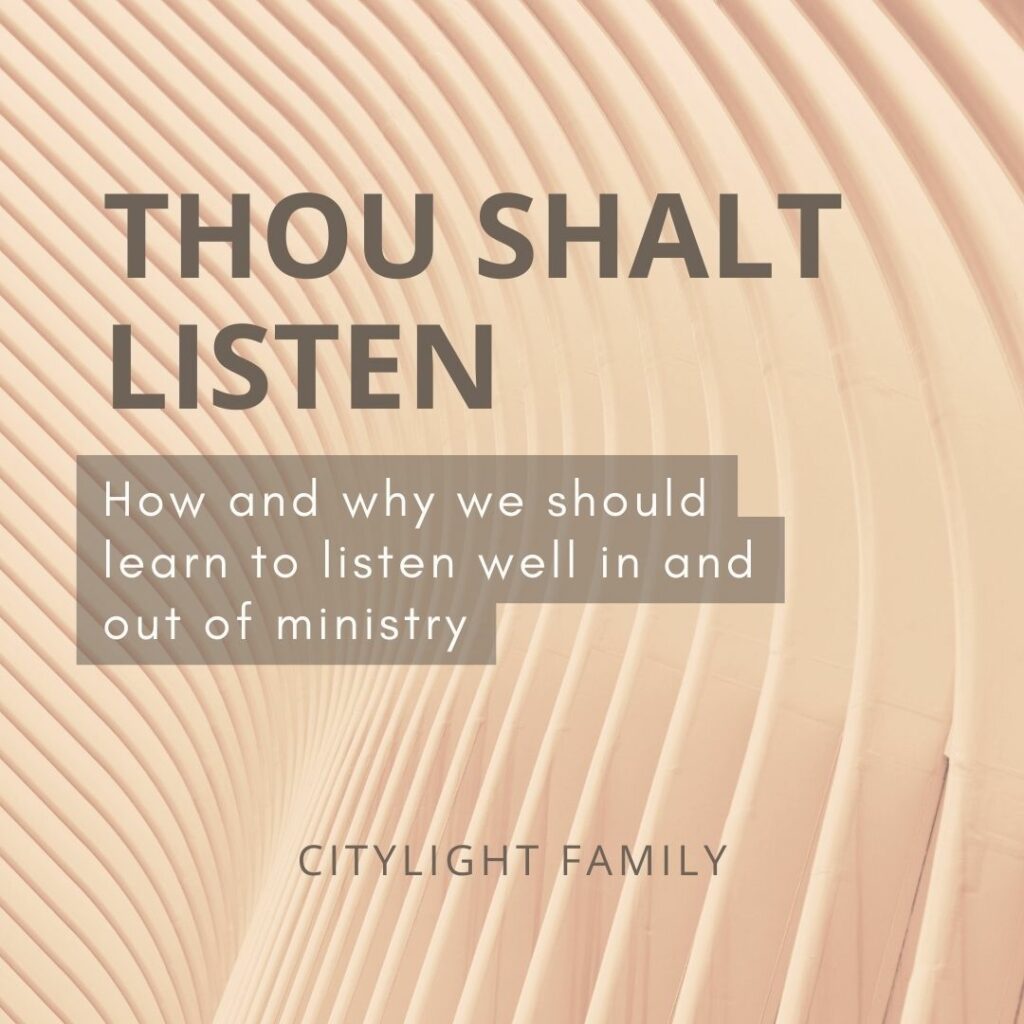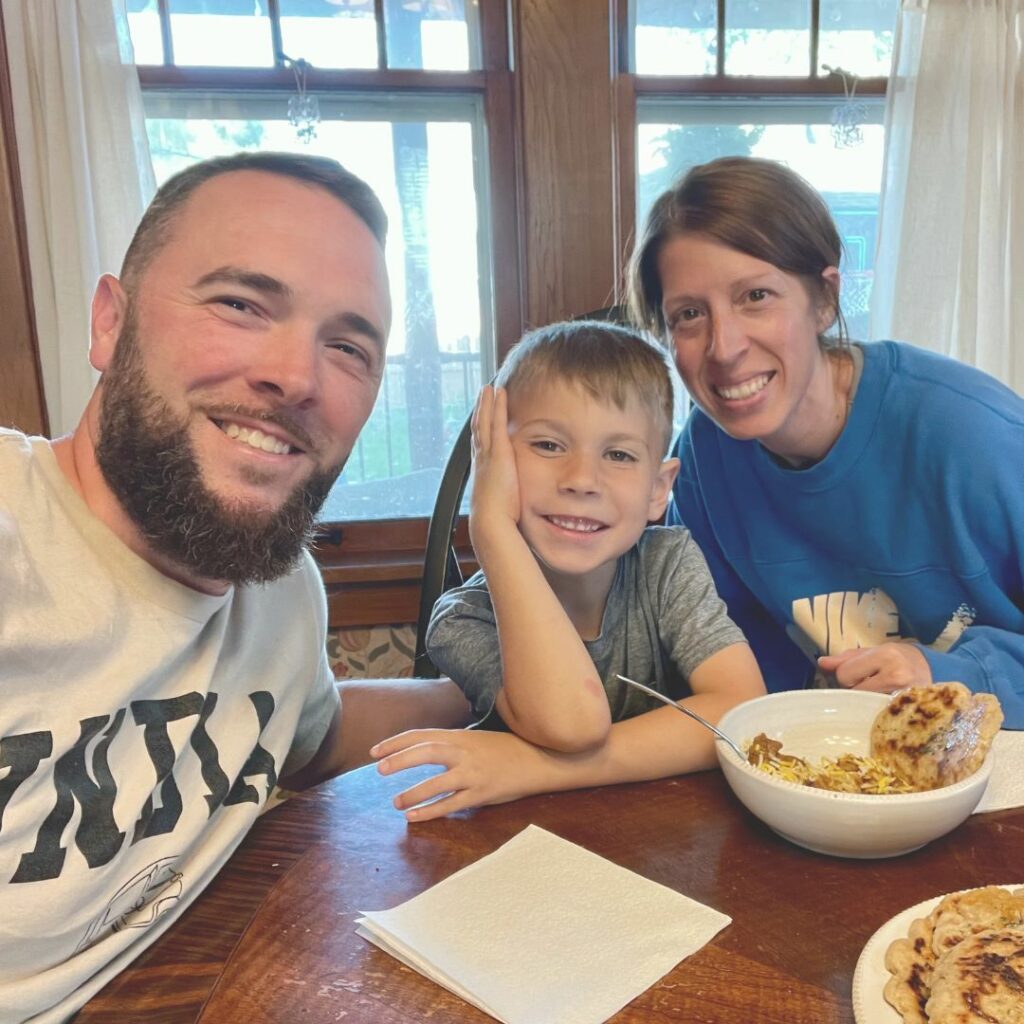How and why we should learn to listen well in and outside of ministry

Citylight Omaha hosts a Listening Workshop led by their Care Team. Recently, Ben Hamilton, Director of Care, shared his notes from the workshop on why and how we can listen well. The goal of listening well is found in Matthew 22:34-40…that we can have deeper and healthier relationships in which the greatest commandment(s) can be fulfilled: Love God and Love Thy Neighbor.
Why listen well?
We were created in the image of the Triune God, who exists eternally in relationship. Implicit in this is that we were created for relationships.
Also, healthy relationships are marked by intimacy. The idea of being fully known, we are fully loved. In the book “Life Together” by Bonhoeffer, he states on pages 97-99; “The first service that one owes to others in the fellowship consists in listening to them. Just as love to God begins with listening to His Word, so the beginning of love for the brethren is learning to listen to them. It is God’s love for us that He not only gives us His Word but also lends us His ear. So it is His work that we do for our brother when we learn to listen to him. Christian, especially ministers, so often think they must always contribute something when they are in the company of others, that this is the one service they have to render. They forget that listening can be a greater service than speaking… We should listen with the ears of God that we may speak the Word of God.”
Our potential to become fully loved increases to the degree we are becoming fully known. In order to know one another, we must listen to one another. The implications and/or risks of not listening well are:
We turn someone into a problem to be fixed, rather than a person to be known (paraphrasing Eugene Peterson). We can come across as unhelpful with ill advice, dehumanizing, etc. Instead, we can take the time and reflect by thinking of a recent example of when you did not listen well, or were impacted by someone not listening well. What was that experience like? Proverbs 18:13 “If one gives an answer before he hears, it is his folly and shame”
Listening well can also build bridges that create more natural opportunities for connecting conversations and ones that are shaped by the gospel. For instance, think of an example when someone listened really well. How did that impact you and change the trajectory of your story?
What does it take to be a good listener?
Two strategies of being a good listener include is having a healthy heart posture and practicing self-awareness.
- With our heart posture, consider the following…
- What is our motivation for listening? (why section)
- Reflect: Think back to a time when someone listened to you incredibly well. What did that feel like? How did it impact you? What new forms of life, beauty, or goodness emerged from that experience?
- Paul Tripp’s 4 Phases of Counseling:
- Love (Welcome them in Jesus’ name, with a humble heart)
- Know (Understand them and their story)
- Speak (Confront and Comfort as the Spirit leads)
- Do (Help them apply God’s Word to their life)
- What is our motivation for listening? (why section)
- With self-awareness, ask questions such as…
- Are you aware of your biases, assumptions, wounds, and overall story?
- In the act of listening, we will bump up against these! Lack of awareness will likely mean they take control (in a problematic way)
- Are you truly present, and able to remain present with this person?
- Presence cannot be faked. If you are distracted, they will shut down/pull away.
- Do I have trust/rapport built with this person?
- Make every effort to take time in phases 1 & 2 (Love, Know) before you try to speak into someone’s life or you may lose them.
- Are you aware of your biases, assumptions, wounds, and overall story?
Lastly, to be a good listener requires the practice of many skills. The top three skills are non verbals, good open-ended questions, and reinstating/paraphrasing.
- Non-verbals (most experts estimate 70-90% of communication is expressed through non-verbals)
- Eye contact
- Facial expressions
- Tone of voice
- Posture
- Gestures
- Timing and intensity of response
- Good open-ended questions that invite more information than a yes/no answer, that display curiosity and a desire to connect in more than a superficial way.
- How, who, what, why, where?
- How did that impact you? Who has been most influential in your life? What were you hoping to get out of that situation? Why do you think you reacted that way?
- Where was God in all that?
- Restatement/Paraphrasing shows a person you are paying attention and clarifies that you are following them/understanding them and their story.
- That season of life was really hard for you, but looking back you see God’s faithfulness and that makes you thankful. You feel alone and isolated, like nobody sees you. It sounds like you are saying you wish you would have handled that differently.
Remember that the goal of listening is to listen well. Not listening to fix. Not listening to win or prove a point. Just listen. We want to listen to build connection, to deepen trust, and to embody love. This will soften hearts and gain you their ear to eventually, wisely share the Word of God in a winsome and informed way.
May we all listen with the ears of God, so that we may speak (more effectively) the Word of God.
Recommended resources: Paul Tripp “Instruments in a Redeemer’s Hands”; Dietrich Bonhoeffer “Life Together”

Ben Hamilton, Citylight Omaha Midtown
